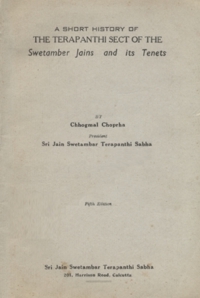- Similarly in the case of Truth; to speak absolute unadulterated truth is possible only for those saints and ascetics who have given up the world and taken to holy orders. Jain Sadhus would keep silent where speaking the truth would cause injury to others. They do not complain against any evildoer, they do not give evidence for or against any person because that may cause bodily or other injury to that person. They are absolutely indifferent to any act of aggression or oppression against their own person even. But this sort of absolute truth-telling is not possible for a layman and therefore as a stepping stone to the practice of the higher form of truth, layman are to begin by guarding against speaking any false-hood on oath or regarding any deposit of property or which may cause breach of trust. If every layman were to practise the art of speaking truth in the broadest sense, many of the social evils would disappear.
- Turning now to the third article of faith, namely non-stealing, it may be stated at once that Sadhus or ascetics would not take even a piece of straw without the permission of the owner. They beg everything, which they require. They live in houses with the permission of the owner. They vacate and give up the house or country if the owner refuses permission. Such high order of non-stealing is not possible for a layman and it is enough if he abstains from taking anything of value without the permission of the owner, not to speak of taking a stolen article, or causing house breaking or transgressing the laws of the land.
- The fourth article is that of Brahmacharyya or refraining from sexual intercourse. It requires the highest form of self-restraint. Of all the passions this is the one, which is the most difficult to control. For an ascetic or Sadhu, the most scrupulous observance of Brahmacharyya is absolutely necessary. He is not only to observe Brahmacharyya himself but he is not to cause others to violate it or countenance any violation of it by any one, by word, thought or action. But for a layman having family ties and friendships and having many dependants, it is not possible to strictly observe Brahmacharyya in all the nine different ways, because he has himself to live a married life and has to contract marriages of his near and dear ones and thus indirectly countenance sexual intercourse. The layman or laywoman therefore takes the vow of being content with sexual connections with the life-partner only and to avoid any intercourse with any other living being. The most sacred foundation or family happiness and of social integrity and purity is based on the observance of this principle of Brahmacharyya. Most of the offences against woman and society would disappear if Jain view of Brahmacharyya and how to observe it were widely known and observed.
- The fifth main article of Jainism is Aparigraha or restriction of possession of property. A monk or Sadhu is not to own any property. He has no house, no landed property, no riches. He begs his daily food and water and articles of clothing when required and lives in other's houses and does not keep even a particle of metal, say even a needle, for his use. For any necessity he has to beg the same for the purpose and return it during the course of the day. He is not to store any article of food or drink after sunset. He has to keep with him only limited articles of dress and receptacles. As he has no money to pay and can not ask others to pay nor can take help of any conveyance, he has to travel on foot and carry his own load. He does not hold correspondence with any layman and does not buy any article for himself nor does he take anything bought or procured for him. But such a high standard of non-possession is possible only for a Sadhu. For a layman the teaching of Jainism is to limit his possessions and desire for possessions. Unlimited or unrestricted desire for possession leads to discontent Self-control is the ideal and limiting one's desire for possessions depends on self-control. There have been millionaires and multimillionaires, there have been Emperors and kings with vast dominions and possessions but so long as they failed to control their desire for possessions they were engrossed with the only idea of increasing possessions. Contentment they had none, peace of mind they seldom had. They thought always of increasing their possession. The life of an ordinary mortal is limited, but the riches of this world are unlimited. If is difficult therefore to satisfy the unrestricted demands of any one. It is therefore of supreme importance that every individual, every society, every nation and every state should limit desire for possessions. Possessions without limit increase the desire and non-fulfilment thereof causes discontent. All the evils of this world, all the conflicts, all the craze for supremacy are due to unrestricted desire for possessions. Every one knows that, every religion proclaims that. Yet none dare preach limitation of possession or need for contentment. How much the world is now in need of this, is apparent TO all observers of contemporary history.
A Short History Of The Terapanthi Sect Of The Swetamber Jains And Its Tenets: 5.4 The Tenets Explained [18-21]
Author:
 Chhogmal Choprha
Chhogmal Choprha
 Chhogmal Choprha
Chhogmal Choprha
Published: 29.09.2010
Sources
5th Edition, 1946
Publisher:
Sri Jain Swetambar Terapanthi Sabha, Calcutta, India

Publisher:
Sri Jain Swetambar Terapanthi Sabha, Calcutta, India

Page glossary
Some texts contain footnotes and glossary entries. To distinguish between them, the links have different colors.
Page statistics
This page has been viewed 1180 times.